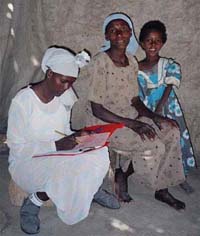12.6.1 Observation
To carry out an observation, you watch and record events as they are happening. Box 12.3 outlines some situations where observation can be a useful method of collecting relevant data.
Box 12.3 Observation is useful to understand
- Community cultures, norms and values in their social context.
- Human behaviour that may be complex and hidden.
When you are observing households, individuals, or more general practice or behaviour in your community, you may find it useful to use a checklist. For example, you could prepare a checklist to keep a detailed record of household practice and environmental hygiene. Following your checklist might help you to be more systematic about the things you are observing. You cannot observe everything at the same time, so the checklist will help you prioritise what to observe, and how to record what you have seen. A checklist is a very helpful tool for observation, and more generally with planning. There is an example of a checklist in Box 12.4.
Box 12.4 Checklist to organise observations
A Health Extension Practitioner has prepared a checklist to help organise her observations when she visits pregnant mothers in her community to put up new insecticide-treated mosquito nets (ITNs).
The checklist includes the following points:
- Is the net hung above the bed? Yes/No
- Has it been tied at all four angles above the bed? Yes/No
- Is the net tucked under the mattress? Yes/No
- Does the net have a hole anywhere where an insect might get in? Yes/No
You have probably already gathered a lot of information by using observation within your community. If you keep alert to all the things that are happening around you, you will be able to gather a lot of very useful information. Systematically observing and recording what you see is an important technique that you can use to identify health problems and their possible causes (Figure 12.5).

Observation is a real skill, and one you can practise very easily. Make a list of a number of small observations you can make in the next week or so. It doesn’t even have to be work related! Then just try a few out, and make a brief checklist for each.
You could observe how many people greet you over one half-hour period, and make a note of how they do it. You could observe how many bicycles go past in ten minutes and the age of the people riding them. Or choose an observation on health education. The important thing is to really pay attention, and then make some sort of record.
12.6 Assessment techniques
